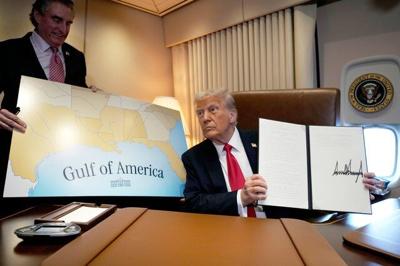The U.S. Court of Appeals on Tuesday denied an appeal by The Associated Press for a hearing on its efforts to restore full access to cover presidential events, not ending its case but allowing the White House to continue its control over access to President Donald Trump.
The the court to overturn not to let AP back into the events until merits of the news organization's lawsuit against Trump was decided. But the court on Tuesday declined to hear that appeal.
It all stems from Trump's decision in February to keep AP journalists out of the Oval Office, Air Force One and other events too small for a full press corps, in retaliation for the news outlet's decision not to follow his lead in changing the Gulf of Mexico's name.
The AP sued in response. In April, a that the administration could not exclude journalists based on their opinions. The Trump administration immediately turned to the U.S. Court of Appeals to successfully delay implementation of the ruling before the court could consider the full merits of the case.
Next up: This fall, the appeals court considers those full merits.
“We are disappointed by today's procedural decision but remain focused on the strong district court opinion in support of free speech as we have our case heard,” said Patrick Maks, an AP spokesman. “As we've said throughout, the press and the public have a fundamental right to speak freely without government retaliation.”
The White House did not immediately return a request for comment.
Since the start of the case, the White House has instituted new rules for access to the limited-space events. AP photographers have been regularly permitted back, but its reporters only occasionally.
On Monday, the White House said it would from The Wall Street Journal onto Air Force One to cover Trump's weekend trip to Scotland because of the outlet's “fake and defamatory conduct” in a story about the president and late financier Jeffrey Epstein.
___
David Bauder writes about media for the AP. Follow him at and .

